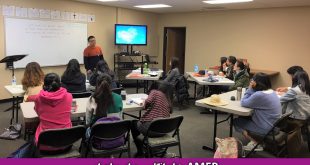In this episode of Walking With Pete I chat to you guys about the importance of learning YOUR most common phrases in the language you’re learning.
Walking With Pete: Learn YOUR Most Common Phrases In The Language You’re Learning
G’day guys. Welcome to this impromptu episode of Walking With Pete. I’m just out going to get a coke from the servo, and a servo is an Australian slang term for “Service station” or “Petrol station”. Obviously, you can tell the word “Servo” comes from “Service” in “Service station”, and we’ve just put an “O” on the end of “Serve”. So, “Servo”. So, you’ll have a lot of Australian slang terms like that quite often with the “O” at the end like “Arvo”, “Peto” instead of “Petrol”, etc. And I just thought I had a few… a few thoughts just now as I left the house. It’s probably about 8 O’clock at night, [it’s] nice and warm. I’m actually out in a t-shirt for the first time in months because it’s been so cold because of winter. I think too the clouds are over tonight so it’s keeping all of the warm air around the city blanketed down close to… close to the ground. So, it’s actually quite nice outside. Um… what was I going to talk about today? So, just as I left the house I had an idea that I wanted to talk to you guys about with regards to learning not just vocabulary in a language that you’re interested in, but learning phrases that you’re interested in. And I’m sure some of you, maybe all of you, may know this with regards to learning English but it’s something that I had to sort of spend a little time working on and I think it was one of those things where when I first started learning French and Portuguese I always saw it as such a mountain, you know, like this huge task that I had to try and ah… surmount or overcome or master, and that it was almost impossible because I saw, you know, look at all these possible words that I could learn or need to learn to be able to use, and it’s just going to take so much time in order to do so. Maybe it’s nearly impossible to actually ever accomplish, but it was interesting when I realised that you get to that point of learning enough vocab that you recognise a lot more than you can say yourself or that you think of when speaking. So, you get a really really large passive vocabulary but your active vocabulary is a lot smaller obviously because you don’t use every single word you know. And, I guess after a short period of time, especially learning how to use websites like Reverso and I think Tatoeba I think it’s called, where you can search for phrases or for words and then you get example phrases of how they’ve been used, I really really love these websites because I don’t just look up the definition of the word. I can also find it in examples sentences that give you context, but most importantly, and this is the point of me making this episode, was to mention that try to look up phrases that you use on a daily basis, common common phrases that you use all the time in your native language and try to find the equivalent way to say those things in English. So, a lot of the time you’re not going to be able to do this by directly translating things, and I can’t… I probably can’t think of any examples off the top of my head at the moment for French or Portuguese. Oh, here’s one for Portuguese. Ok, so, I always want to say “Absolutely”, “Absolutely”, and it’s something that you can say in English quite a bit but even though there’s a word in Portuguese, “Absolutamente” it sounds weird to Portuguese speakers for someone to say that when in English I would say “Absolutely”. Instead, in Portuguese you would say something like “Claro” or “Com certeza”, which means “of course”, “of course” or it is the direct translation, or not direct, the indirect translation of saying “absolutely” in English. So, something really important to have in mind when you’re learning English is to try and find ways to say phrases that you always find yourself saying in your native language and find the equivalent way of doing that in… in English. Don’t literally translate all of the… all of the words or all of the phrases that you would otherwise potentially do, and I found myself doing that quite a bit, and a lot of the time native speakers of the language you’re translating into will get pretty confused and quite often it doesn’t mean exactly what you think it means. And I mean we all do this, there’s not really much you can do when you don’t know how to say something, but to try and guess or to try and translate it from how you would say it in your native language. And another example, another funny example of me doing this in French, and I think Portuguese’s the same, Portuguese is the… I think Portuguese is the same as well, is when I try and say “I’m excited” and in English “I’m excited” is just to say that you’re pumped up, you’re anticipating something. So, like “Today I’m going to the football and I’m excited to go to the football” or “Today it’s my birthday and I’m excited to see my family and to get presents”, “I’m excited” it’s kind of to anticipate something, to be happy, to be amped up. But if you’re to say this directly translated in French or in Portuguese, I think in French it’s… If I were to directly translate it it would be “Je suis excité” and in Portuguese it would be “Estou exitando [exitado*]”, I think. And, um… I think in both those cases it means something like “turned on” or “horny”. So, like sexually excited and not just excited in general. So, you can’t directly translate it like that. Anyway, these are the kinds of things I love using the websites to look up these kinds of phrases because websites like Reverso don’t directly translate these phrases. I think they’ve had people translate books or translate huge swathes of text and it’s not directly translated. So, a lot of the time you get the equivalent phrases in English and in Portuguese or in English and in French. And so, you can learn the different ways to say the same things that you say in your native language, and that’s the most important thing. Don’t learn things that you’re not going to say with regards to building your active vocab. You want to be able to say and express the thoughts that you have in your native language all the time, you effectively want to learn exactly the same thing but in any other language that you’re learning because you’re quite often going to be using those exact same thoughts all the time in conversations, and the same kinds of phrases. And so, yeah, there’s many many different ways of skinning a cat we say in English, but you just need one that works. So, that’s probably it for this episode guys. So, just remember try and find equivalent translations to things that you already say in your native language that you can say in a language you’re learning. ‘Til next time guys, all the best!
 ایرانیان استرالیا Australia Iran بزرگترین جامعه ایرانیان ساکن استرالیا Australia Iran
ایرانیان استرالیا Australia Iran بزرگترین جامعه ایرانیان ساکن استرالیا Australia Iran











